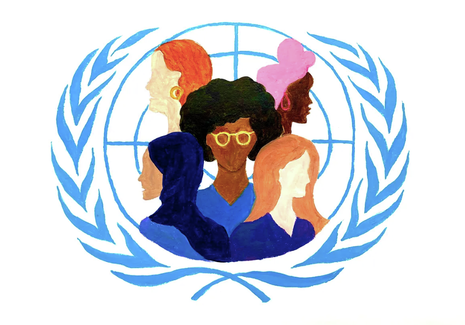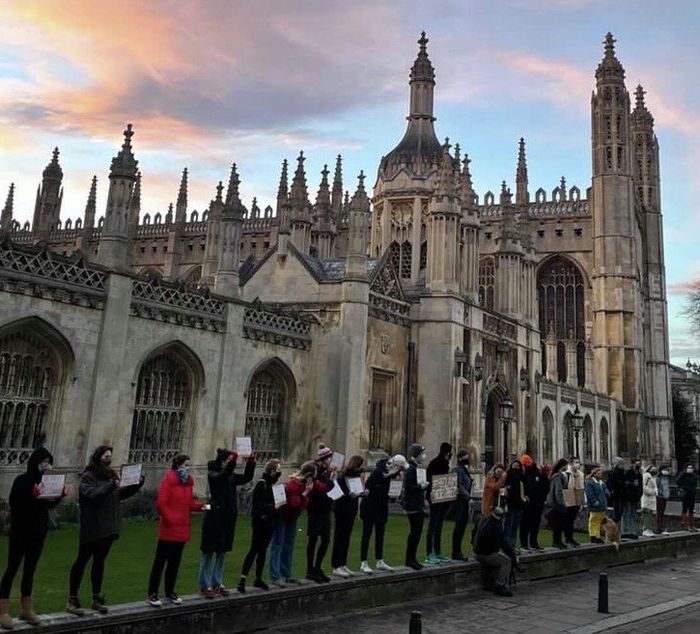The global fight against misogyny
Eva Carroll represents the UK at the 65th United Nations Commission on the Status of Women

Content Note: This article contains detailed discussion of gendered violence.
The Monday after Sarah Everard’s death, I was a UK Delegate to the 65th UN Commission on the Status of Women (CSW) where I encountered global misogyny representative of that witnessed in the UK just days earlier.
Usually held in New York, this annual event creates a blueprint to shape global laws and policies. It serves as a body to promote women’s rights worldwide and create space for women to share their experiences. It consists of official meetings where States’ Parties discuss outcomes, side events hosted by national governments and UN entities, and over eight hundred parallel events arranged by independent NGOs, charities, and women’s groups.
Unsurprisingly, what CSW confirmed about global gender inequality was heartbreaking and infuriating. Almost nine in ten women in cities around the world feel unsafe in public spaces and every ten minutes somewhere in the world an adolescent girl dies because of violence.
The opening ceremony showed from the outset that this misogyny is not okay and needs to be combatted. Kamala Harris, the Vice President (VP) of the United States, told us that “The status of women is the status of democracy”. VP Kamala Harris made it starkly clear that if women and other marginalized genders are oppressed, then a nation cannot claim to be truly democratic. Being in a Zoom with VP Kamala Harris made me feel as though the big world in which we live in shrunk. Here I was, a traditionally working-class girl from Liverpool having conversations with people who seem to far away and out of reach. CSW showed me that the people and positions which we see as unattainable are all possible and within our grasp, meaning change is too.
“Being in a Zoom with VP Kamala Harris made me feel as though the big world in which we live in shrunk”
Looking ahead to how we achieve this democratic goal, Secretary General of the UN Antonio Guterres stated in his keynote address that this freedom can only be achieved through women and their allies claiming what is rightfully theirs, as “Power is not given, it must be taken”.
We discussed an intersectional variety of topics affecting women globally: violence in its numerous forms, child marriage, Covid recovery, freedom of expression for female journalists, widowhood, bodily autonomy, toxic masculinity, police response, online abuse, and modern slavery to name a few. It was harrowing to see the pervasiveness of misogyny, manifesting in different forms of violence and inequality across the world.
The unequal gendered impacts of the Covid-19 pandemic and recovery plans weave women across nation states together. Women have been trapped in their houses with violent partners, held most of the burden for domestic unpaid work in the house and led the home learning effort in most households.
In the UK, online abuse has increased, with 46% of women experiencing it during the pandemic, and 29% saying it had gotten worse over lockdown. Across UN member states, the pandemic is likely to force 47 million women and children into poverty. In addition, UN Women UK found a massive underrepresentation of women on Covid 19 taskforces, with 26 out of 225 across 24 countries having no women members at all.
It was thrilling but disturbing to be in the heart of such a potent conference, as halfway through the conference, delegates had to come to terms with the fact that Turkey had withdrawn from the Istanbul Convention. The Istanbul Convention, named after Turkey’s largest city, seeks to prevent violence against women, including domestic violence, and bring an end to legal impunity for perpetrators. Watching this unfold demonstrated just how fragile international treaties and organisations can be in the face of national sovereignty.
Another prevalent issue was the safety of women in public spaces, which the Istanbul Convention would help solidify alongside projects such as Safe Spaces Now by UN Women UK. Speaking to Charles Ramsden from the UK Government Equalities Office, he told us how the UK has signed but not ratified this convention as it first desires domestic laws to comply with the treaty. This suggests that the UK wants to be part of the global movement for gender equality, yet its domestic laws are simply inadequate to allow them to be part of progress at the moment. Every country can do more to make women safer, and the past month in the UK has shown us the desperate need for this support.
“Women and girls are dying and suffering every single day in every single country, so why can’t every single one of us stand up for them?”
The intensity of the British public’s rage at Sarah Everard’s death needs to be connected to the anger at gendered violence across the globe because violence against women and girls exists in every corner of the globe and it is our responsibility to challenge it. Women and girls are dying and suffering every single day in every single country, so why can’t every single one of us stand up for them? It is so frustrating that it takes the death of a middle-class white woman who was seemingly taking all the right precautions to push gender-based violence headline material.
There were many proposed solutions, ideas, and examples of best practice and successful strategies which were shared. Being part of such a salient, international conversation and joining forces with women across the world gave me hope – hope of a better future where women like Sarah get to live their lives. Today, there are millions of women out there fighting for that future who will not give up until it is achieved.

“Boys will be boys” and the entrenchment of victim-blaming
Meeting women from such diverse backgrounds to share experiences, problems and solutions gave me a sense of sisterhood and solidarity I have never felt before on such an international scale. I heard activists from India talk about their survival of child marriage, journalists from Sudan talking about the violence they face daily, and survivors of FGM from all over the world say that they want to save their daughters.
There was a range of issues and importance of intersectionality was highlighted throughout, yet there was also a recognition of the common ground we stand on. I felt that together we could tackle global problems, map out misogyny and set out to destroy it together.
After the conference, the words that most echo in my brain are those of a poet who performed at the conference, Tene Edwards, who writes, “Today I affirm that I will pick up my broken pieces and transform them into wings… From this day forward, I will walk with wings”.
Living life as a woman or an ally can be exhausting, and we can all feel a little broken sometimes; but this patriarchal system and its constructs need to be broken to be rebuilt.
Persist in the face of adversity. Speak up against all odds. Fight for equality and never give up.
 News / Hundreds of Cambridge academics demand vote on fate of vet course20 February 2026
News / Hundreds of Cambridge academics demand vote on fate of vet course20 February 2026 News / Judge Business School advisor resigns over Epstein and Andrew links18 February 2026
News / Judge Business School advisor resigns over Epstein and Andrew links18 February 2026 News / Petition demands University reverse decision on vegan menu20 February 2026
News / Petition demands University reverse decision on vegan menu20 February 2026 News / University Council rescinds University Centre membership20 February 2026
News / University Council rescinds University Centre membership20 February 2026 News / CUCA members attend Reform rally in London20 February 2026
News / CUCA members attend Reform rally in London20 February 2026









